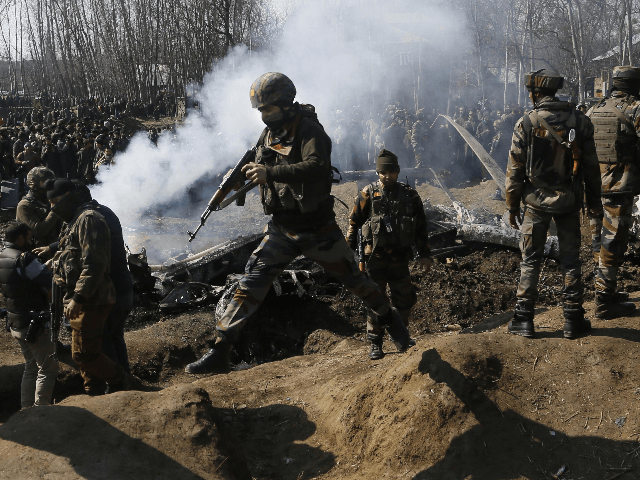Chinese state media on Monday continued pumping out a stream of belligerent editorials chiding India for believing its soldiers could possibly defeat the invincible People’s Liberation Army (PLA), a propaganda counterattack against Indian officials who claim their troops did exactly that in last week’s Ladakh border clash.
The true casualty count from the hand-to-hand brawl along the fluid Line of Actual Control (LAC) border in the Ladakh region of the Himalayas remains unknown. Indian officials say 20 of their soldiers were killed and claim the Chinese lost over double that number, even though Chinese forces outnumbered the Indians at most times during a melee that lasted several hours and saw both sides calling in reinforcements.
The Chinese military has not released an official casualty count, reportedly (but not publicly) admitting only to the deaths of an officer or two. The only explanation offered for this reticence to discuss the outcome of the battle is that Chinese officials are supposedly reluctant to stoke nationalist fervor among their own people by telling them how many PLA soldiers were killed.
China’s fusillade of tough-talking editorials have plenty of nationalist fervor on display. The first in a trio of editorials from the state-run Global Times on Monday told Indian nationalists to stop being “blindly optimistic” of their army’s ability to defeat the PLA, sneering that India has gone blind to the gap between its “weaponry, deployment, and equipment and those of China.”
“Chinese analysts said that nationalists and hardliners in India are stoking anti-China sentiment and instigating a war with China despite the gap of military capability between the two sides,” the Global Times reported, in the long tradition of Chinese state media quoting itself as an unimpeachable source.
The editorial grudgingly allowed that India and China have built roughly equivalent forces along the LAC in Ladakh, but suggested China is better positioned to quickly reinforce its troops during a conflict because it has superior road access to the area – an assessment the Indians would not dispute since they have been trying to beef up their own road network over China’s very loud objections.
The Global Times then cited some more “Chinese analysts” who said India’s artillery, armor, and air forces are “no match for their Chinese counterparts” in terms of “firepower, mobility, level of informationization, and tactics,” especially in high-altitude regions. It added that the Indian Navy does not stand much of a chance either if it decides to get rowdy in regional waters.
“Indian troops use weapons made from all over the world, which means a high logistical support cost and incompatibility between systems. India will find the maintenance and repairing of these weapons difficult in the battlefield, and the incompatibility means that many of these weapons cannot be used together or share information, and they would have to fight only loosely together in which friendly fire can become possible,” another Chinese analyst asserted.
“India cannot win a war against China, but Indian nationalists do not believe so,” still another cohort of Chinese analysts concluded, citing China’s 300 percent advantage in military spending over India.
None of that would explain why China’s supposedly invincible “wolf warriors” lost a fight with rocks and sticks, but the Global Times continued assuring India it cannot win a fight in any other theater of battle with another editorial that confidently boasted China controls so much of India’s economy that boycotts are tantamount to “suicide.”
“In terms of global value chains, India won’t have many choices left if it wants to boycott Chinese products, and would only bring higher costs for its firms and customers. Additionally, some Indian industrial sectors rely heavily on supplies from China and are unable to operate without cooperation with China,” the Chinese paper wrote, triumphantly describing a situation Indians are beginning to deeply resent.
“Under such circumstances, it is irrational for India to heat tensions or reduce economic ties with China as the two countries are not in the same heavyweight class. China has been a top trading partner of India for years, while China’s exports to India have accounted for about 2 percent of its total exports,” the editorial boasted.
The Global Times blamed India for “sabotaging” fruitful economic cooperation with China and advised the Indian government to “devise rational economic strategies based on the comprehensive assessment of its own capacity to avoid following a self-destructive path.”
The third trash-talking editorial from the Global Times on Monday denounced India for loosening the restrictions on its border troops using guns to defend themselves and warned that if Indian troops open fire on their Chinese adversaries, the border dispute will become a “military conflict” that India would lose badly.
The editorial called Indian Prime Minister Narendra Modi “extremely irresponsible” for giving his troops “complete freedom of action” to defend themselves.
“We would like to warn India’s feverish nationalists not to lead New Delhi down the wrong path, and not allow India to repeat past mistakes,” the Chinese Communist paper wrote before reciting the standard boasts about China’s GDP and military spending looming many times larger than India’s, plus the same points made in the earlier editorial about China’s “advanced weapons” being locally made while India relies on imported military hardware.
“There are things that the Indian army cannot get without using firearms, and even more unlikely for them to get these things through armed conflicts. That the Indian troops can defeat the People’s Liberation Army (PLA) is utter fantasy,” the Global Times declared, blaming “India’s extreme nationalists” for stoking that fantasy.
“In history, India has miscalculated China’s will several times, and been muddle-headed about the strength gap of the two sides, leading to its recklessness and the heavy price it had to pay. Wasn’t the same true with the June 15 clash?” the editorial concluded, asking a question that could only be answered if China reveals how many soldiers it lost on that bloody evening.

COMMENTS
Please let us know if you're having issues with commenting.